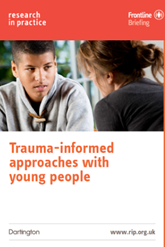Adverse Childhood Experiences (ACEs)
Childhood experiences can have a massive impact on a child’s health and opportunity. Adverse childhood experience (ACEs) is a term used to describe stressful or traumatic events that children and young people can be exposed to whilst growing up. ACEs range from experiences that directly harm, to those that affect the environment in which a child grows.
There is however a distinction between ‘normal’ stressful life events, such as parental divorce or illness of a loved one, and adverse childhood experiences,
ACEs have been categorised into two categories
1. Child Maltreatment which includes:
- Verbal abuse
- Physical abuse
- Sexual abuse
- Emotional and physical neglect
2. Household adversity which includes:
- Mental illness
- Domestic violence
- Alcohol abuse
- Drug abuse
- Imprisonment
- Parental separation
Very traumatic life events, such as being or seeing someone else physically or sexually abused are experiences that will often be associated with post-traumatic stress disorder.
Research indicates the presence of a greater number of ACEs indicates the greater risk of negative outcomes. (Bellis et al 2014) These negative outcomes include poor physical and mental health, chronic disease (such as type II diabetes, chronic obstructive pulmonary disease; heart disease; cancer), increased levels of violence, and lower academic success both in childhood and adulthood.
ACEs can create dangerous levels of stress and compromise a child’s healthy brain development, which can result in long-term effects on learning, behaviour, health and quality of life into adulthood.
The UK Trauma Council also offer a guidebook on Childhood Trauma and the brain.
UK Trauma Council - Childhood Trauma and the Brain resource
Childhood Trauma and the Brain - UK Trauma Council
The Impact of ACEs
When exposed to stressful situations, the “fight, flight or freeze” responses are our body’s natural automatic answer as the body prepares for survival from an attack, threat or harm. The threat floods our brain with corticotrophin-releasing hormones (CRH), which usually forms part of a normal and protective response, which subsides once the stressful situation passes. We all need to activate a fight-or-flight response at times to keep us safe e.g. avoiding an angry dog in the park or stepping out of the way of a speeding car.
However, if exposure to ongoing domestic violence, neglect or physical abuse where danger is frequent and unpredictable, a child will remain in a heightened state which can lead to long-lasting changes in how the brain responds to danger.
For example:
- Fight: Behaviours can include being angry, controlling, confrontational, inflexible, unable to concentrate, pushing family/friends away. To the child, this might feel like being tense, faint, dizzy, nauseous, hypervigilant, quickened heart rate.
- Flight: Behaviours can include being hyperactive, disruptive, running away, hiding, unable to follow rules. To the child, this might feel like being afraid, panicky, sweating, overstimulated.
- Freeze: Behaviours can include being bored, forgetful, confused, daydreamy, wide eyed, room-scanning. To the child, this might feel like anxiety, terror, disconnection, numbness, fast breathing, hearing tone of voice only (not what’s said).
- Submit: Behaviours can include being withdrawn, alone, unhappy, fidgety, unquestioning, passive. To the child, this might feel like being drained, numb, invisible, anxious, unwell.
ACEs, therefore, can have a negative impact on childhood development, which in turn can give rise to harmful behaviours, social issues and health problems in adulthood, the more ACEs a child experiences, the greater the impact for social and/or health problems in later life. Research has shown that there is a measured response relationship between ACEs and poor mental and physical health; chronic diseases; increased levels of violence and lower academic achievement in childhood and adulthood.
The more ACEs in a child’s life the higher the risk for these outcomes.
How can we respond to ACEs?
When a child discloses trauma, there are numerous steps we can take to negate the impact of the experiences:
- Listen to the child’s experiences. Think about how those experiences will have an impact on their healthy development and on their behaviours.
- Recognise the signs and see beyond a child just ‘acting out’.
- Try to help them feel they are more in control by giving them choices.
- Understand that it is likely this will have an impact on any attachment for that child and there will be mistrust. We need to try and build a relationship with the child that is different to ones they have experienced previously.
- Finally, it is important to remember that ACEs tend to be passed from generation to generation if parents do not receive support to reflect upon childhood stressors, and to explore how these may feed into current problematic behaviours and ongoing health issues, this in turn will impact on their ability to parent well.
Research in Practice have published the briefing below which is designed to support staff and managers using trauma-informed practice
Further Resources and Information
Understanding trauma and adversity | Resources | YoungMinds has a range of resources to raise awareness about the impact of adversity and trauma on the mental health of children and young people. Find resources including a poster and e-book on their website at youngminds.org.uk/addressing-adversity-book
Trauma and the Brain (9-minute video) Highlights the impact of trauma on the brain, particularly on memory.
Beacon House develops freely available Resources about trauma and adversity.
Resources include a Comic Strip illustration of how a shift from traditional language to trauma informed descriptions of vulnerable individuals can create compassion instead of blame, hope instead of hopelessness and connection rather than disconnection.
![]()
As a service they have a specialist interest in repairing the effects of trauma and attachment disruption and through their website provide some useful resources for both professionals and families.

